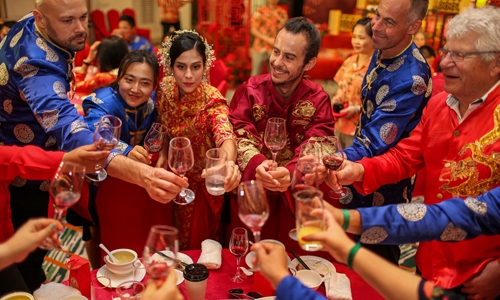Sichuan Province holds first wedding banquet since COVID-19 outbreak; traditional Chinese wedding customs adapt to pandemic requirements
By Ji Yuqiao Source:Global Times Published: 2020/3/31 9:33:19

A foreign couple from France and Spain have a Chinese-style wedding in South China's Hainan Province in April 2019. Photo: VCG
Couples in China with wedding plans have been anxiously waiting for the day when the ban against large gatherings will finally be lifted. Well, one lucky couple in Southwest China's Sichuan Province was finally able to celebrate with family and friends at the province's first wedding banquet, or xijiu, on Thursday, although they quickly discovered that many customs had been adapted to fit the current times.
The provincial government of Sichuan removed the prohibition against group meals on Wednesday, and just a dozen of hours later, the province's first wedding banquet following the COVID-19 outbreak was held at a hotel in Chengdu, capital of Sichuan, according to a report of Red Star News.
The couple's original wedding banquet, scheduled for the end of January, had to be postponed due to the implementation of strict regulations concerning various public activities after January 24.
"We were waiting for the day when the ban would be lifted," a manager of the hotel surnamed Peng told the Red Star News. Once the ban was removed early Wednesday morning, they immediately got in touch with the lucky couple.
The wedding banquet was successfully held Thursday afternoon, but with far fewer guests than a normal banquet and with many more restrictions.
Most traditional wedding banquets are happy affairs with the newlyweds inviting their family, friends and even coworkers. Guests are normally assigned to specific seats at packed tables where people share fancy food brought to them by attentive wait staff.
By comparison, the banquet on Thursday was a far more mellow affair.
The 60 or so guests were limited to people who have been living in Chengdu for the past month, and all attendees had to register their ID information and have their temperatures checked before entering the hotel. While getting dressed up is usually a must for a Chinese wedding banquet, this banquet also required everyone to wear one additional accessory: a face mask.
As for seating, tables that normally seat 10 people were limited to four to five guests and the wait staff that would normally bring everyone their food was replaced by a buffet-style meal requiring guests to get up and serve themselves. For those who wanted to save some trips by sharing their food, a pair of serving chopsticks were provided for every pair of guests, who nevertheless had to keep an empty chair between them, according to a hotel employee.
Some places in China, including Beijing and Tianjin, have still not eased restrictions concerning large gatherings, so many couples in these areas are still waiting for their big day.
Twenty-six-year-old Anhui, who planned to hold her wedding in Nanning, South China's Guangxi Zhuang Autonomous Region in May, told the Global Times that she had to postpone her wedding and the subsequent banquet until the end of September.
"I prepared for the whole year of 2019, but now all I can do is to wait and pray my wedding will not be postponed once more," she said.
There are signs that indicate that couples in the capital may not have to wait too much longer. An employee of a Beijing wedding planning company said that they are accepting appointments online and that "May is possible."
Even after the restrictions are lifted, some couples may be a bit nervous gathering family and friends together, especially if it means bringing together older and therefore more vulnerable family members.
Looking to assuage these fears, a wedding company in Beijing's Xicheng district said they can arrange self-service meals and outdoor weddings to keep things less packed once restrictions are lifted.